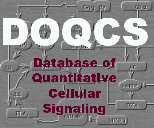
|
Enter a Search String | | Special character and space not allowed in the query term.
Search string should be at least 2 characters long. |
Molecule Parameter List for CaM-Ca4 | The statistics table lists the distribution of a molecule acting either as a substrate, product, enzyme or as a molecule within the network.
The text color of a molecule is highlighted by  color. color. | | Statistics |
Accession and Pathway Details | |
| Accession Name | Accession No. | Accession Type | Pathway Link | Ajay_Bhalla_
2004_PKM_MKP3_
Tuning | 77 | Network |
Shared_Object_Ajay_Bhalla_2004_PKM_MKP3_Tuning, PKC, PLA2,
PLCbeta, Ras, Gq,
MAPK, EGFR, Sos,
PLC_g, CaMKII, CaM,
PP1, PP2B, PKA,
AC, MKP3, PKM | | This model is based on Ajay SM, Bhalla US. Eur J Neurosci. 2004 Nov;20(10):2671-80. This is the feedforward model with MPK3 from figure 8a. |
CaM-Ca4 acting as a Molecule in Ajay_Bhalla_2004_PKM_MKP3_Tuning Network
CaM-Ca4 acting as a Substrate in a reaction in Ajay_Bhalla_2004_PKM_MKP3_Tuning Network
| Kd is calculated only for second order reactions, like nA+nB <->nC or nA<->nC+nD, where n is number and A,B,C,D are molecules, where as for first order reactions Keq is calculated.
Kd for higher order reaction are not consider. |
| | Name | Accession Name | Pathway Name | Kf | Kb | Kd | tau | Reagents | | 1 | CaM-bind-GEF | Ajay_Bhalla_
2004_PKM_MKP3_
Tuning
Accession No. : 77 | Ras
Pathway No. : 333 | 199.998
(uM^-1 s^-1) | 1
(s^-1) | Kd(bf) = 0.005(uM) | - | Substrate
CaM-Ca4
inact-GEF
Product
CaM-GEF
| | | We have no numbers for this. It is probably between the two extremes represented by the CaMKII phosph states, and I have used guesses based on this. kf=1e-4 kb=1 The reaction is based on Farnsworth et al Nature 376 524-527 1995 2 Aug 2004 Raised Kf from 60 to 200 to achieve higher MAPK activation following Ca stimulus for PKM models. 3 Aug 2004. Lowered Kf to 100. | | 2 | CaMKII-bind-CaM | Ajay_Bhalla_
2004_PKM_MKP3_
Tuning
Accession No. : 77 | CaMKII
Pathway No. : 339 | 49.9995
(uM^-1 s^-1) | 5
(s^-1) | Kd(bf) = 0.1(uM) | - | Substrate
CaM-Ca4
CaMKII
Product
CaMKII-CaM
| | | This is tricky. There is some cooperativity here arising from interactions between the subunits of the CAMKII holoenzyme. However, the stoichiometry is 1. Kb/Kf = 6e4 #/cell. Rate is fast (see Hanson et al Neuron 12 943-956 1994) so lets say kb = 10. This gives kf = 1.6667e-4 H&S AnnRev Biochem 92 give tau for dissoc as 0.2 sec at low Ca, 0.4 at high. Low Ca = 100 nM = physiol. | | 3 | CaMK-thr286-bind
-CaM | Ajay_Bhalla_
2004_PKM_MKP3_
Tuning
Accession No. : 77 | CaMKII
Pathway No. : 339 | 1000.17
(uM^-1 s^-1) | 0.1
(s^-1) | Kd(bf) = 0.0001(uM) | - | Substrate
CaM-Ca4
CaMKII-thr286
Product
CaMKII-thr286*-C
aM
| | | Affinity is up 1000X. Time to release is about 20 sec, so the kb is OK at 0.1 This makes Kf around 1.6666e-3 | | 4 | CaMCa4-bind-CaNA
B | Ajay_Bhalla_
2004_PKM_MKP3_
Tuning
Accession No. : 77 | PP2B
Pathway No. : 342 | 600.003
(uM^-1 s^-1) | 1
(s^-1) | Kd(bf) = 0.0017(uM) | - | Substrate
CaM-Ca4
CaNAB-Ca4
Product
CaMCa4-CaNAB
| | 5 | CaM-bind-AC1 | Ajay_Bhalla_
2004_PKM_MKP3_
Tuning
Accession No. : 77 | AC
Pathway No. : 344 | 49.9995
(uM^-1 s^-1) | 1
(s^-1) | Kd(bf) = 0.02(uM) | - | Substrate
AC1
CaM-Ca4
Product
AC1-CaM
| | | Half-max at 20 nM CaM (Tang et al JBC 266:13 8595-8603 1991 kb/kf = 20 nM = 12000 #/cell so kf = kb/12000 = kb * 8.333e-5 | | 6 | CaM_bind_PDE1 | Ajay_Bhalla_
2004_PKM_MKP3_
Tuning
Accession No. : 77 | AC
Pathway No. : 344 | 720
(uM^-1 s^-1) | 5
(s^-1) | Kd(bf) = 0.0069(uM) | - | Substrate
CaM-Ca4
PDE1
Product
CaM.PDE1
| | | For olf epi PDE1, affinity is 7 nM. Assume same for brain. Reaction should be pretty fast. Assume kb = 5/sec. Then kf = 5 / (0.007 * 6e5) = 1.2e-3 |
CaM-Ca4 acting as a Product in a reaction in Ajay_Bhalla_2004_PKM_MKP3_Tuning Network
| Kd is calculated only for second order reactions, like nA+nB <->nC or nA<->nC+nD, where n is number and A,B,C,D are molecules, where as for first order reactions Keq is calculated.
Kd for higher order reaction are not consider. |
| Name | Accession Name | Pathway Name | Kf | Kb | Kd | tau | Reagents | | CaM-Ca3-bind-Ca | Ajay_Bhalla_
2004_PKM_MKP3_
Tuning
Accession No. : 77 | CaM
Pathway No. : 340 | 0.465
(uM^-1 s^-1) | 10
(s^-1) | Kd(bf) = 21.5052(uM) | - | Substrate
Ca
CaM-Ca3
Product
CaM-Ca4
| | Use K3 = 21.5 uM here from Stemmer and Klee table 3. kb/kf =21.5 * 6e5 so kf = 7.75e-7, kb = 10 |
| Database compilation and code copyright (C) 2022, Upinder S. Bhalla and NCBS/TIFR
This Copyright is applied to ensure that the contents of this database remain freely available. Please see FAQ for details. |
|
